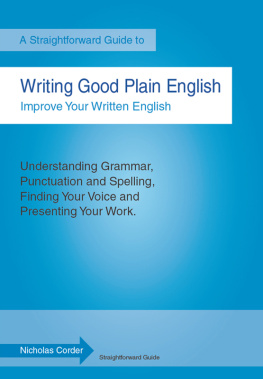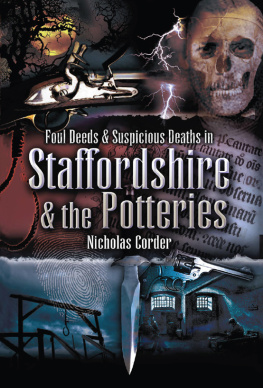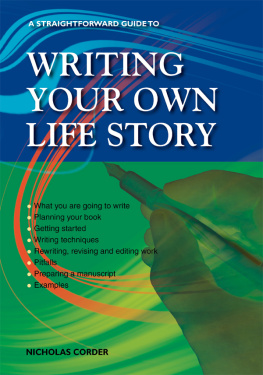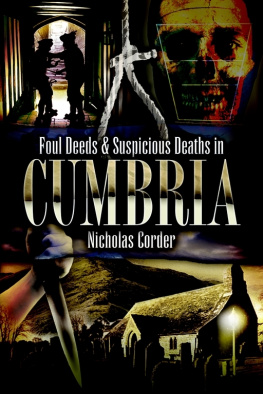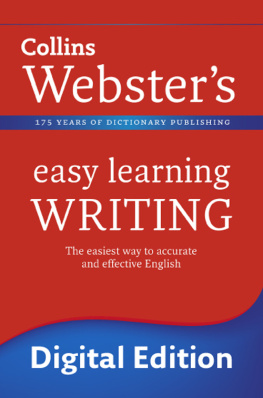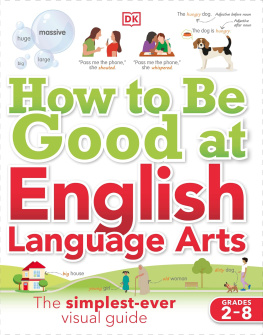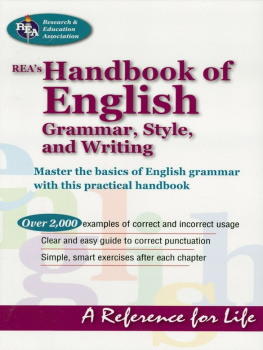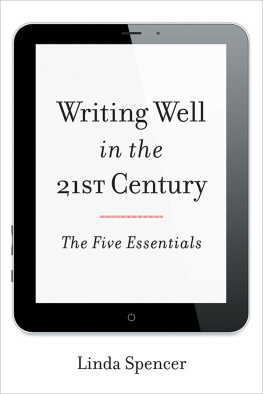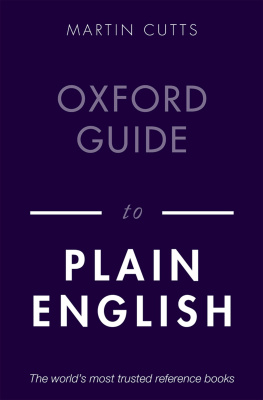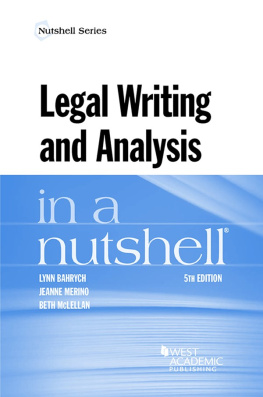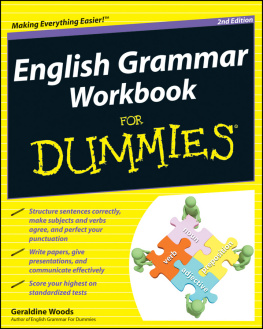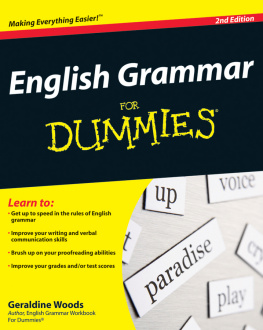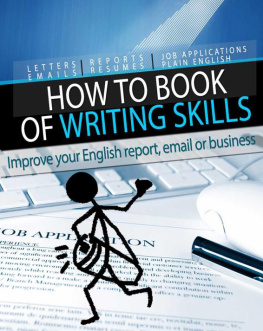A Straightforward Guide
To
Writing Good Plain English
Improve Your Written English
Nicholas Corder
Straightforward Publishing
www.straightforwardco.co.uk
Straightforward Guides
First Edition Nicholas Corder 2013
All rights reserved. No part of this book may be reproduced in a retrieval system or transmitted by any means, electrical or mechanical, photocopying or otherwise, without the prior permission of the copyright holder.
British Library Cataloguing in Publication data. A Catalogue record of this book is available from the British Library.
ISBN 9781847163691
Printed by Berforts Press
Whilst every effort has been made to ensure that the information contained within this book is correct at the time of going to press, the author and publisher cannot accept responsibility for any errors or omissions contained in this book.
Contents
****************
Foreword
Put it before them briefly so they will read it, clearly so they will appreciate it, picturesquely so they will remember it and, above all, accurately so they will be guided by its light.Joseph Pulitzer.
Congratulations on picking up this book. You are a person of distinction and, if I may be so bold, you are easy on the eye. I like your hair. I like your clothes. I like the cut of your jib.
Now, before you take this book to the till, have the librarian swipe it onto your card, add it to your cyberspace shopping trolley, or even send it wirelessly to your e-book reader, let me tell you a little about the treats in store for you. That way, you know if its worth shelling out your hard-earned cash and spending several hours of your hectic life reading it.
In a nutshell, this book aims to do exactly what it says on the cover help you write good, plain English. The fact that youre reading this introduction means that youre the kind of person who would like to write well. You may be looking for a rule book. Beware of rule books. If there are such things as rules, they change quickly and are not always that helpful. This is a guidebook, not a straitjacket. You may even disagree with some of the things in here, and thats fine.
Nor is this is a finger-wagging book. These are available. They have titles such as If You Cant Even Write A Sentence You Must Be A Complete Prat, Only Total Divs Cant Spell or Dont They Teach Them Anything at School Nowadays? If you want to feel as though youve just crawled out of a sewer to be harangued by a man with a purple face, then please put this book down now and go and buy one of those. They are written by people who have never misspelled a word, cocked up a sentence or forgotten half-way through a paragraph what on earth it was they were writing about. This book is not meant to be a reprimand to some naughty child whos made a blooper. This book will not jeer at you if you get something wrong. Its meant to help you. It is a kind book, a soft book. Its the kind of book you could take home and introduce to your parents.
This book acknowledges that were all human.
Writing is a difficult process. After all, around 20% of the population of the UK have genuine literacy problems and struggle with everyday written language. The English language is also complex. Its almost like some giant organism in a sci-fi film that sucks in spellings and grammatical constructions from other languages. It changes constantly, adding new words. And then once those words are established, they go and change their meaning.
Of course, this book tries to help you avoid the kind of grammatical howlers that have spittle-blowing retired colonels reaching for their fountain pens to condemn the current educational system. Yes, its great to be able to spell correctly and stick the commas in the right place. So we do have a bit of that in here. There are sections devoted to dealing with grammar, punctuation and spelling. Theyre not the most interesting topics in the world, so youll notice that all that stuff is towards the back of the book. I try to work on the principle that you dont have to eat loads of cornet before you can get at the ice cream. Some sections, youll only want to use for reference.
But the book also tries to go beyond that. Sure, lets get the basics right, but lets also look at how to make what you write interesting something that other people might want to read. Whats the point of being able to spell and punctuate correctly if you dont have anything interesting to say or do have something you feel passionate about, but cant convey your excitement to the reader?
And thats where our friend Pulitzer comes in. Good, plain English is what Pulitzer relished. Not just plain English, or good English, but a combination of the two. He was after more than just bare bones information. He wanted to be entertained, uplifted, carried along by the written word.
I dont expect you to read this book at a single sitting. Dip in and out of it as the mood takes you. Try to think about what youre reading and put it into practice when you can. Get some of those clever peel-off sticky labels and mark up the parts that are most relevant to you. Write in the margins (unless its a library book). You can even do the exercises. Try not to cheat. Above all, dont turn reading this book into a chore, especially if its been foisted on you by a teacher or lecturer. And if youre a teacher or a lecturer, dont foist this book on your students. Recommend it, by all means, but please dont turn it into a dry text for analysis.
As I say. Youre smart, good-looking, well-turned-out. We could have a future together. Click that button, swipe that card. Lets get going.
***************
1
Why good, plain English?
Lets come back to something I touched on briefly in the foreword. Why both good and plain? Why not just plain English? After all, we know that clarity is important. We dont want to baffle the reader. Why not just keep it simple?
Plain English is excellent at reducing complex sentences to something more understandable. It cuts through the jargon and the gibberish. It removes redundant words and forces the writer to write in a straightforward manner. Of course there is a place for it. You want it when you come across heart-sinking internal emails or signs on office walls, such as:
At the end of every working session, please ensure that the window latches in your office are secure as there has been a series of on-going thefts from offices recently.
Its long-winded. We are better off replacing it with something like:
Please lock your office windows when leaving the building there has been a recent spate of thefts.
Thats plain English. You could make it even plainer, but lets not get too blunt. Plain English is also what we use in our everyday lives, so we dont have to dip into a pool of unfamiliar words. Using everyday language means we are more likely to create an immediate rapport with the reader, who is not going to be stumbling over awkward, unfamiliar terrain. If the reader immediately grasps what you are trying to say, then you have done the job well. The office windows should be locked.
If all were doing is writing a few basic instructions, then short, plain language is fine. If were trying to make sure that a member of the public buying our services understands potentially difficult terms and conditions clauses, then plain English is exactly what we need.
However, many of us often have to write at a more complex level than this. We write essays and reports, press releases and conference papers. We need to be able to persuade, entertain or inform, without our readers dying of boredom.
The danger with plain writing alone is that it doesnt always reflect genuine complexities. It is also often dry and humourless. What we want is something that has a little bit of flair to it; something that has style, but which isnt stylised. We also want to engage the reader.

